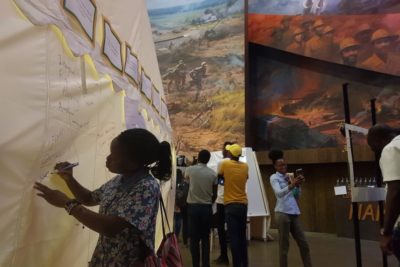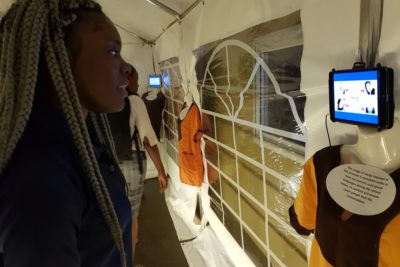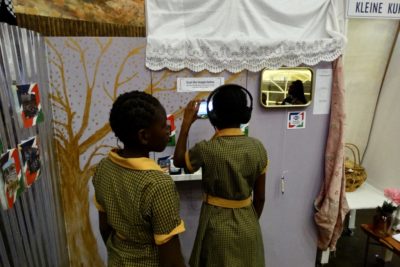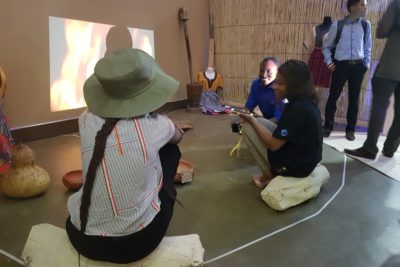Exhibition date: 21 October – 30 October 2019
PhD Researcher: Asnath Paula Kambunga
The ‘Postcolonial Narratives of Born Frees’ exhibition was co-designed with ten Namibian youth ‘bornfrees’, and five Interaction Design students from Namibia University of Science and Technology. The central focus of the exhibition was the youth’s everyday experiences of postcolonialism, in which five themes namely- education, languages, indigenous knowledge, economics, and division were explored.
In the exhibition, we used interactive technologies such as Augmented Reality and soundscape technologies as a way of amplifying the youth narratives and to make the visitors experience more enjoyable and interesting. We divided the exhibition into three sections: past, present, and future. The exhibition was designed in a way that the visitors have to go through all the installations to comprehend the ideas behind the design. The first installation in the present section used soundscape technology and played multiple voices of the youth – addressing the topics in the themes named above. The visitors could then choose to mute some of the voices and listen to the single voices. This installation was designed as a way to empower and give a platform to those normally not listened to and for their voices to be heard.
In the past section, we used augmented reality with two aims: firstly, as a way of learning from the past /from our elders. We set up an indigenous knowledge installation to tap into the knowledge that may not be documented in books yet. The visitors could scan the markers and watch videos of elders explaining their indigenous knowledge. Secondly, we wanted to showcase youth ideas about the past. In a playful manner, the visitors could place magnets printed with different tribes’ pictures on the Namibian map. If placed in the right spot, a video will show some of the traditional practices of the tribes and if some magnets are scanned next to each other, then a video will play- showing historical events between the tribes.
We placed a green screen in the past section – where visitors could take pictures with late iconic political leaders or with a war-themed background. This was mainly done because the youth have expressed how they are discriminated against and they also feel guilty for not being part of the liberation struggle. This setting was playful and allowed the visitors to take a souvenir from the exhibition. The visitors who gave consent for their images to be shared on social media are available on twitter @thebornfrees account.
After the past section, the visitors had to go through the present section again. We constructed a bridge with two paths: The easy way and the hard way where the visitors had to make decisions in the present, that may affect the future. The present section also contained an installation that used augmented reality and showed the social justice system in Namibia.
The future section was filled by questions, engaging the visitors in giving ideas on how we can create a future where many voices are heard and designed in a participatory approach. The visitors could answer questions on the wall or add their own. The visitors also answered yes or no to provoking questions so that the visitors to start thinking more future-oriented.
The overall exhibition came about as a result of a six-month collaboration with the youth who also identify as ‘bornfrees’ – a term used to refer to people born after Namibian independence in 1990. Collaboration, reciprocity learning, and empowerment have been some of the key principles in the design process. Thus, we used two pragmatic approaches: Design Anthropology and Participatory Design. The emerging Design Anthropology was very useful in understanding every day, cultural realities of the youth, while participatory afforded the opportunities to design for the future at the same time giving an opportunity for all team members to be knowledge creators.





